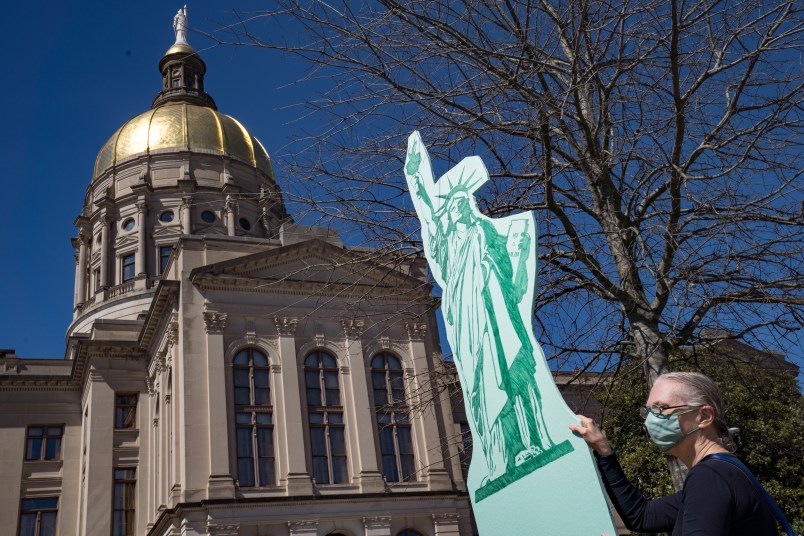Several civil rights groups on Tuesday announced that they have filed a third legal challenge against the new Georgia elections overhaul law.
The latest legal challenge against the battleground state’s new restrictive voting law is a federal lawsuit spearheaded by the Sixth District of the African Methodist Episcopal Church, Georgia Muslim Voter Project, Women Watch Afrika, Latino Community Fund Georgia and Delta Sigma Theta Sorority, Inc. The case was filed by the American Civil Liberties Union, ACLU of Georgia, NAACP Legal Defense and Educational Fund, Inc., Southern Poverty Law Center, and law firms WilmerHale and Davis Wright Tremaine on behalf of the civil rights groups.
The lawsuit is at least the third legal challenge the new law faces. On Monday, several other civil rights groups alleged that the Georgia law intentionally discriminates against Black voters by violating the Constitution and the Voting Rights Act.
Last week, almost immediately after Georgia Gov. Brian Kemp (R) signed into law sweeping changes to the state’s election rules, Black community groups filed a lawsuit challenging several of its provision. That lawsuit said the new law “inflicts severe burdens on Georgia’s voters” and violates both the Constitution and the Voting Rights Act.
The lawsuit announced by several civil rights groups on Tuesday alleges that the new law adds to Georgia’s history of being “unrelenting in its effort to suppress the political participation of people of color.” The lawsuit takes aim at several provisions in the new law, such as “new and burdensome” ID requirements to request an absentee ballot, limitations on the time period to request absentee ballots and its ban on “line warming” that would prohibit volunteers from handing food and water to voters waiting in line.
The lawsuit also alleges that the new law will disproportionately place burdens on voters of color, especially Black voters, who have been historically disenfranchised. The lawsuit pointed to the tendency of voters of color to lack IDs or access to obtaining them, their utilization of weekend voting, reliance on secure drop boxes, their likelihood of casting provisional ballots and their need for water in order to withstand long voting lines.
Additionally, the lawsuit acknowledged that the election results in Georgia were “celebrated not only because of record turnout, but also because of its integrity.” It alludes to judges and Georgia’s own state and local election officials — which include Georgia Gov. Brian Kemp (R), Secretary of State Brad Raffensperger and voting implementation manager Gabe Sperling — refuting then-President Trump’s bogus claims of widespread election fraud.
“The losing presidential candidate and his allies launched an unsubstantiated attack on the integrity of the election and sought to reverse its results, claiming that it was beset by fraud,” the lawsuit reads. “But each of the baseless allegations underlying this attack were rebuked, both by judges in lawsuits and by Georgia’s own state and local election officials.”
Sophia Lakin, deputy director of the ACLU’s Voting Rights Project, decried the new law in a statement by arguing that it is “driven by blatant racism.”
Sherrilyn Ifill, the NAACP LDF’s president and director-counsel, said that the law is “perhaps the most bold and shameful voter suppression legislation enacted” in modern history with the purpose of creating more hurdles for Black voters who played key roles in the record-setting voting turnout of the November 2020 presidential election as well as the January 2021 special election that determined the current 50-50 balance of the Senate.
“The provisions of the new law and the manner in which it was enacted reflect a thorough disregard for the sanctity of protecting the right to vote and a headlong and determined zeal to diminish Black political power in Georgia,” Ifill said.







Good. Sue the hell out of them.
Is it possible to legally challenge Justice Robert’s definitive legal opinion that we now live in a post-racial country where the Voting Rights Act is no longer warranted? IMHO, there is ample evidence that he cast his vote on whimsical evidence.
Ms. Ifill is right.
(She’s also the daughter of immigrants and cousin of the late Gwen Ifill, who used to appear on PBS.)
Georgia is trying hard to become the new Texaflorissippi.
Roberts’s error was evident as soon as he published his opinion, but I’m not quite sure how you tactfully tell the Chief Justice he had his head up his ass.